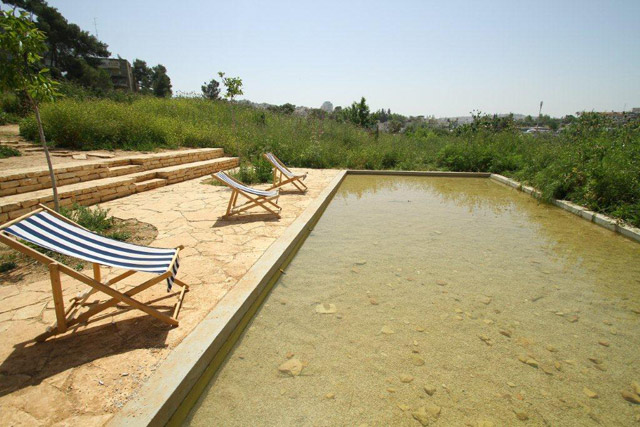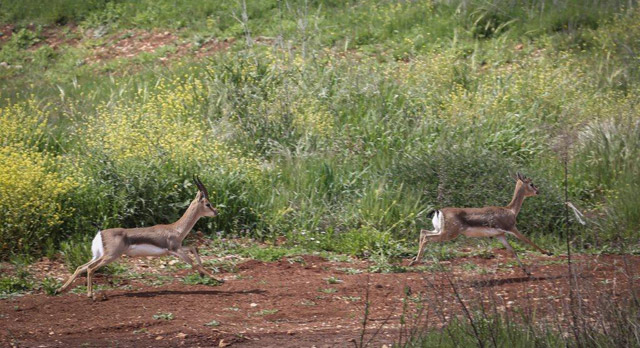The
Jerusalem Municipality is currently putting the finishing touches on the first nature park of its kind in Israel. Slated to open at the end of this month, Gazelle Valley stretches over 250 dunams, and features five ponds, both natural and manmade, two flowing streams, bird and rodent watching areas, the natural habitat of untamed animals, a manmade island accessed via wooden bridges, and the park's namesakes - dozens of wild gazelles roaming free.
The completion of the park is an unprecedented victory for the municipality and the public over the real estate tycoons who sought to build high-rises on the land. The park will soon be open to the public, seven days a week with free admission - as of Monday, March 30.
The new city park represents an innovative urban approach of open spaces located in the heart of the city, such as Central Park in New York, Hampstead Heath in London, and Parc St. Jacques in France. This approach, applied nowhere else in Israel, stresses the importance of creating a green lung composed of natural greenery and hosting a variety of animals and birds capable of living in the heart of an urban environment, to be enjoyed by city residents as well as visitors from Israel and abroad.
 An urban park in JerusalemCopyright: Arnon Bossani
An urban park in JerusalemCopyright: Arnon BossaniJerusalem Mayor Nir Barkat said: "The park's guiding principle is revolutionary in terms of Israeli urban public spaces - a nature reserve in the middle of Jerusalem. Gazelle Valley is one of the biggest and most important Jerusalem projects in recent years, representing above all community involvement in the city and the power of joint brainstorming and planning by City Hall and residents. For us, the Gazelle Valley project represents the direction in which we want to take the city: developing Jerusalem's green spaces together and in partnership with the community and with the backing of many municipal entities working to enhance the environment and protect Jerusalem's natural assets."
In fact, over the years, the park, located in the city's southwestern corner at the foot of Highway 50 (Begin Boulevard) and Pat Junction, became a symbol of the public and civil struggle for open spaces in the city. In the past, the grounds were home to many fruit orchards, but in the 1980s these were abandoned and the location acquired a new identity: it became known as “gazelle valley” for the herd of gazelles that inhabited the site. Over the years, the herd became trapped among busy highways, the Malha Mall and various residential projects, with no habitat left. Because of harm caused by human agents and stray dogs, the herd shrank to only five gazelles.
 The gazelles return to JerusalemCopyright: Flash 90 (Courtesy Israel Ministry of Tourism)
The gazelles return to JerusalemCopyright: Flash 90 (Courtesy Israel Ministry of Tourism)As the herd was dying off, real estate developers "discovered" the spot and applied for permission to build more high-rises there. In an unprecedented move, various segments of Jerusalem's population united - religious and secular, old-timers and new immigrants, members of the entire span of the political spectrum - with the help of the Society for the Protection of Nature in Israel and other environmental organizations and social activists, and began a persistent fight against planning and zoning authorities to establish an urban nature park in the valley. Six years ago, Jerusalem Mayor Nir Barkat joined the residents' struggle, and it was decided to establish the first urban nature park of its type in Israel.
Landscape architects from Israel and abroad paved walking trails and bicycle paths, built a wading pool for young children, and set aside shaded spots perfect for observing nature. In the future, the park will also feature an orchard and a farm pond as well as an educational center devoted to the mountain gazelle (Gazella gazella), which is native to this part of the Middle East, and will be home to the Jerusalem Center for Urban Nature. Gazelle Valley will also be part of the Jerusalem Municipality's master plan, featuring bicycle paths that will go all around the park and link up with two already existing bicycle paths running along Sacher Park and Mesila Park. At a future date, a wooden promenade will be built above Gazelle Valley and link the park to the surrounding neighborhoods.
The fully accessible park will be open to the public all week long and will charge no admission. At the entrance, it will be possible to borrow binoculars, deck chairs and mats. In the future, it will be possible to buy ready-to-eat picnic baskets as well. It will offer guided tours, educational activities on topics of the environment and sustainability for school children, communal Friday evening Sabbath services, small chamber music concerts played by local ensembles, and more.
The park is being built by the Jerusalem Municipality with help from the Society for the Protection of Nature in Israel, the Jerusalem Development Authority and the Jerusalem Foundation.